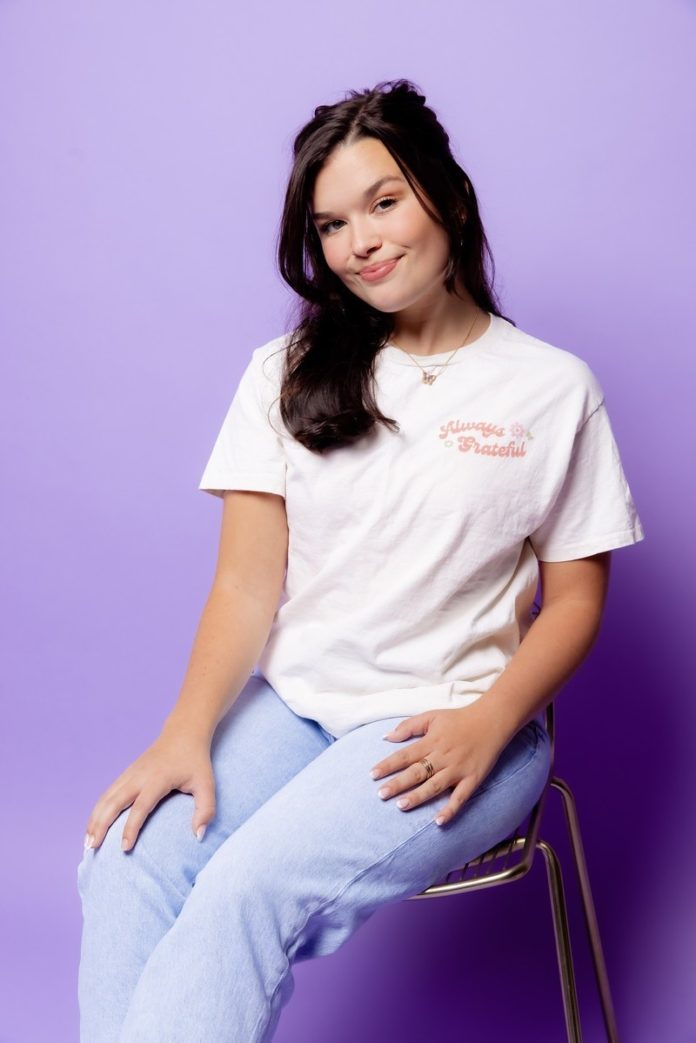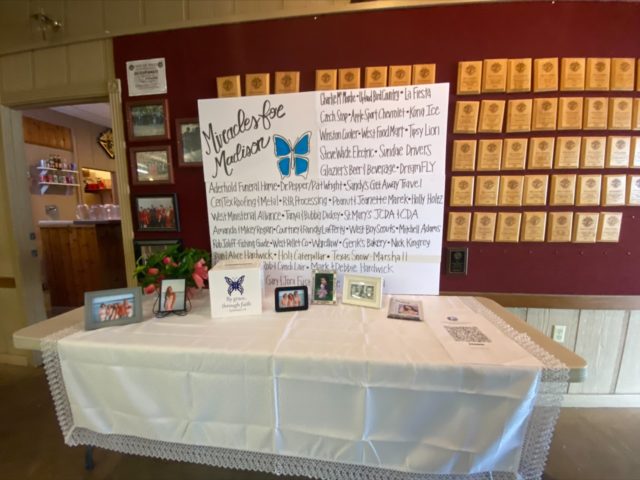By Avery Ballmann | Guest Contributor
China Spring 21-year-old Madison Hardwick had many plans for herself. She had always wanted to be a photojournalist and travel the world, but in her high school senior anatomy class, she found an interest in the medical field. Madison then shifted her plans to the field of sonography. Ultrasounds were her idea of the “photos for the human body.” Little did she know, she’d be the patient and not the one controlling the machines.
Madison was accepted into the sonography program at Austin Community College (ACC) to attend in fall 2020. She moved to Georgetown and was living on her own for the first time. Madison excelled in the program, making an A in every class. However, when it came to the clinicals, which involved lots of standing and motor movement with the machines, Madison found it difficult to be on her feet all day. She then knew she couldn’t keep her diagnosis a secret anymore — she had been diagnosed with Friedreich’s Ataxia (FA) in June 2020.
FA is a rare, inherited nerve disease affecting 1 in every 50,000 people, and it damages the nervous system and reduces muscle coordination. The diagnosis came after her senior year of high school; Madison always thought she was just clumsy and it was nothing serious, but at 19 years old, she was facing the loss of independence and her ability to walk.
Madison didn’t tell anyone of her diagnosis for six months — not even her professors. After not passing the clinical portion by 0.2 points, Madison determined her plan for sonography wasn’t the right pursuit anymore.
“I didn’t want special treatment or people to look at me differently,” Madison said. “I had to let go of all of my original plans that I had for myself, and I felt like that wasn’t something I should continue.”
Madison moved back home and used COVID-19 as a way to isolate and heal from her diagnosis. When Madison was ready to share her diagnosis after many months to process, she became an advocate for FA and used her social media platform to spread awareness.
“When I was first diagnosed, I never wanted to talk about or acknowledge it,” Madison said. “I thought if I didn’t talk about it, it wasn’t real or it would go away — that’s obviously not the case.”
FA has no cure, and the only treatment to prolong walking is physical therapy, which is not covered by insurance. Her grandmother Debbie Hardwick and her family friend Jeni Janek came up with the idea to host a benefit to pay for physical therapy.
“A lot of times, that’s done on a word-of-mouth scale or maybe it’s in the newspaper or maybe it’s in a few church bulletins, but I wasn’t really satisfied with that,” Janek said. “I wanted people to understand how amazing Madison is and how strong she is through what she has been enduring these past few years.”
Janek coordinated with the media to get the word out on the benefit, and Debbie was over the committee, which later took on the name Miracles for Madison. The benefit was held on Oct. 26 in West, about 20 miles north of Waco, and it brought in many community members. The event raised over $70,000 for Madison’s therapy.
“I know her through my classmate Joni (Madison’s aunt),” Karen Davila said. “I invited a lot of my family today.”
Debbie lives in West and said her community “steps up for benefits.” The event had a silent auction, barbecue plates, a gun raffle, a live auction, face painting and a gift card tree.
“If I could have the disease, I would take it away from her,” Debbie said. “It breaks my heart. She’s so pretty inside and out. She has a really big heart.”
The benefit had many volunteers from Madison’s family and members of West, including the Boy Scouts and the Knights of Columbus West chapter. At the benefit, Madison made a speech about FA before the food was blessed.
“I am an advocate, but talking about it is hard for me,” Madison said. “I have to be vulnerable, and I was vulnerable in front of a lot of people that I didn’t even know.”
Madison’s physical therapist, Jen Howicz, has worked with FA patients before and knows the physical and mental effects of the condition.
“It is a very isolating thing to receive a diagnosis like Friedreich’s Ataxia,” Howicz said. “Suddenly, you have a condition where those who love you are treating you differently; people don’t treat you the same as they did before.”
FA not only affects Madison but has also had an impact on her family. Madison’s little sister, Brayden Hardwick, shared how the diagnosis impacted her relationship with Madison.
“It definitely made me realize that I need to cherish what moments we still have — all the things we can still experience as we are right now,” Brayden said.
At the benefit, Brayden gave Madison emotional support by giving her pep talks and staying by her side. Madison said Brayden is her “protector,” even though she is the older sister.
“I was so overwhelmed with love and support from my whole family, all of the people and all of the conversations,” Madison said. “I will never forget that day.”
Madison goes to Round Rock once a week for physical therapy and occupational therapy, and she does aquatic therapy in Waco. Madison said FA is financially draining.
“What sets Madison apart is even when things are low, she’s still going at 100%,” Howicz said. “I shouldn’t even say 100%; it’s even stronger. She doesn’t let the emotions or the fear control her journey.”
In some ways, Madison said she has gotten stronger because she works her muscle strength in therapy, but in other ways, there is a decline in her condition, which is expected with FA. Howicz’s prediction is if Madison had not pushed as hard as she does, she would have had more of a decline, but Madison has also experienced growth outside of therapy.
“When I started raising awareness for it (FA) and advocating, I accepted it for myself,” Madison said. “I accepted it as part of me so that I could move forward, just being an advocate and making that part of my identity instead of something I had.”
Madison has conducted two T-shirt sales that have made $3,400, and she donated the money to Friedreich’s Ataxia Research Alliance (FARA). FARA is a nonprofit whose money is devoted to FA research and awareness.
“FARA is supporting the development of treatments aimed at each of these different mechanisms of damage,” FARA’s website reads. “Because it is based on solid basic science discovery, this targeted approach to treatment has great potential.”
Madison is part of an online FA group chat consisting of about 150 people from all over the world ranging from the ages of 15 to 25 who fight the same but different fight as Madison is fighting.
“Everybody doesn’t fit into a pattern, so some people may develop certain things earlier and they may not develop them at all,” Howicz said. “It’s totally individualized.”
In Madison’s case, she said she struggles with fatigue and works on protective extensions, which are used to protect herself when her balance is unsteady. This is an important exercise to prolong her ability to walk and remain as independent as possible.
“The longer she can keep up her therapy, the longer she’ll be out of that wheelchair,” Debbie said. “That I know someday will come.”
When Madison was first diagnosed, she swore to herself that she would never share her story. Now, she continually advocates on her social media and updates her followers on her journey.
“In advocating, I find strength,” Madison said. “I love relating to people.”
Madison said she is now focused on stepping in as her role as the older sister. She loves giving her siblings advice and spending time laughing with them. She goes on late-night drives with her sister Brayden, and they scream out Taylor Swift songs together.
“It feels like it’s just me and her — it’s only me and her,” Brayden said. “At the end of the day, we both have each other, and that’s all that matters.”
Now accepting her diagnosis, Madison is currently finishing her associate degree in psychology online at ACC and will graduate this December. She plans on applying to Tarleton University through McLennan Community College to continue with her bachelor’s degree.
“I’m finally getting into a routine where I love life again,” Madison said. “I spend time with my family, hang out with friends. I babysit my niece, who’s five months old. I’ve just been enjoying the little things in life.”







